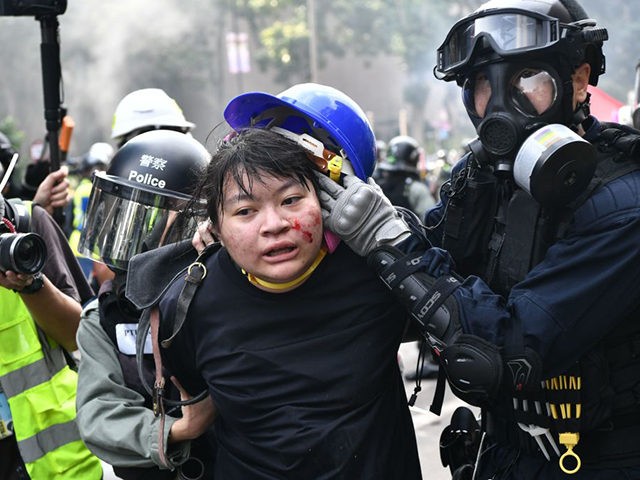Hong Kong’s chief security official, John Lee Ka-chiu, said on Wednesday that a special unit of police will be created to enforce the national security law Beijing is imposing on the island.
According to Lee, the new unit will have “intelligence gathering” capabilities and will coordinate with Chinese forces.
Lee also made it clear the new unit will be subordinate to Chinese security forces.
“I’m sure that the mainland [Chinese] authorities have a much wider network of intelligence gathering and also a much higher level of analysis. They have a helicopter view of the whole thing. So they will let us know the whole picture when we, as a city, may not be able to just use our information,” he said.
Lee told the South China Morning Post (SCMP) that the new unit would be ready to begin operations on the “very first day” the security law is imposed. No firm date has been determined yet, but the law is widely expected to be passed by the National People’s Congress in Beijing and implemented by the end of this month.
The SCMP noted that among the few details provided about the new security law, it will both compel Hong Kong’s government to create new national security agencies and give mainland forces more latitude to operate in Hong Kong “when needed.”
“The law has prompted widespread concerns it could effectively criminalize all forms of dissent and opposition activity, although the government has offered repeated reassurances it would only target a small, criminal minority,” the SCMP observed.
Lee suggested the new police unit would start small but grow as needed, and could incorporate officers from other Hong Kong police and security agencies. He pointed to the inter-agency security commission in Macau, another semi-autonomous Chinese possession, as an example of how Hong Kong’s approach might work.
Lee said “international politics” would play a role in how the new security force operates, repeating the Chinese Communist Party’s (CCP) allegations that Taiwan and the United States “played a role in the evolution of the anti-government movement” that dominated Hong Kong news for the past year.
Lee said the U.S. Hong Kong Human Rights and Democracy Act, passed by Congress and signed by President Donald Trump in November to support the pro-democracy movement, was “against international law and amounted to utter interference in Hong Kong internal affairs.”
He also defended the extradition bill that launched the protest movement last year and was subsequently withdrawn, saying it was needed to “put a stop to the violence, to the unlawful activities and to the threats facing society.”
Both the United States and United Kingdom, former administrators of Hong Kong until 1997, have warned China not to proceed with its planned national security law. British Foreign Secretary Dominic Raab on Thursday advised Beijing to “step back from the brink and respect Hong Kong’s autonomy and respect its own international obligations.”
“It is incumbent on the Hong Kong government to acknowledge not just the economic causes of the unrest, but also its people’s concerns about their freedoms and values,” said Raab.

COMMENTS
Please let us know if you're having issues with commenting.